Seedbox part 2: eBay disks, Aliexpress adaptors, Raid 0 over USB (oof) and a Dremel
Table of Contents
A brief Recap⌗
I set up a torrent seedbox on my desk and that worked great! The first post is here in case you missed it.
I paired it with a 500gb 2.5" drive I had lying around and its seeding away 24/7 at 15-30Mb/s. But that only gave me 750gb of storage to work with and that isn’t enough for my enterprising file sharing goals.
Sure it was good enough for a start:
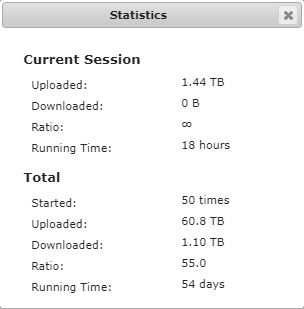
But two things happened:
- I ran out of space
- The I/O usage was pegged at 100%, probably due to too much random I/O access from dozens of torrents
More storage was needed, and if I could get it fast and cheap, then better!
Getting more storage⌗
In the spirit of keeping this a budget project, I went looking for cheap storage on eBay, and I found some Seagate Terascale 4TB drives for 49€ each. I offered 47€ a piece for two drives, the seller accepted, and a few days later here they were:

The date codes are from early 2014, these certainly came from a datacenter somewhere. Neat.
These don’t fit anywhere on the mini pc I’m using for seedboxing:
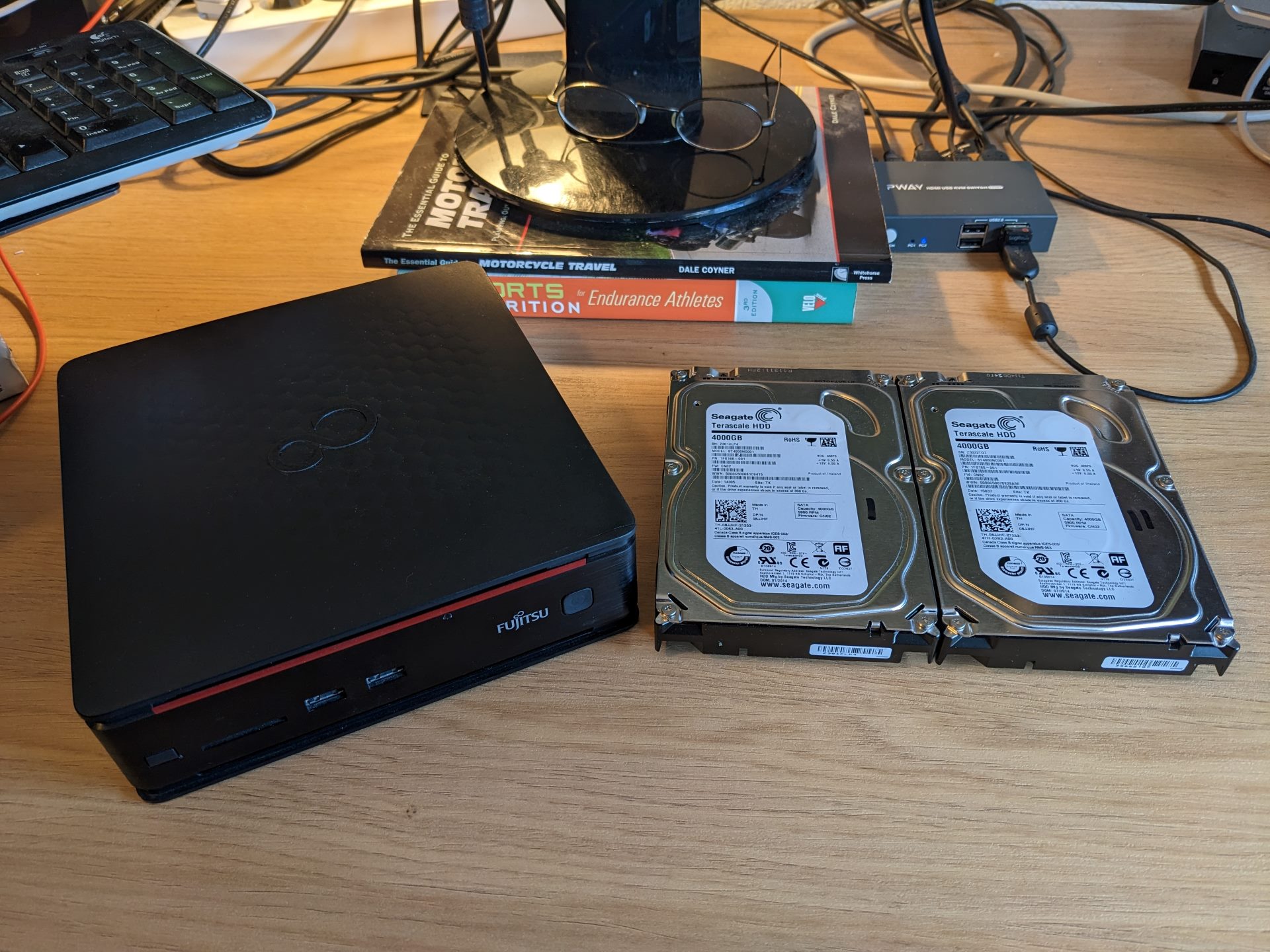
Which means we’re going to do this over USB:
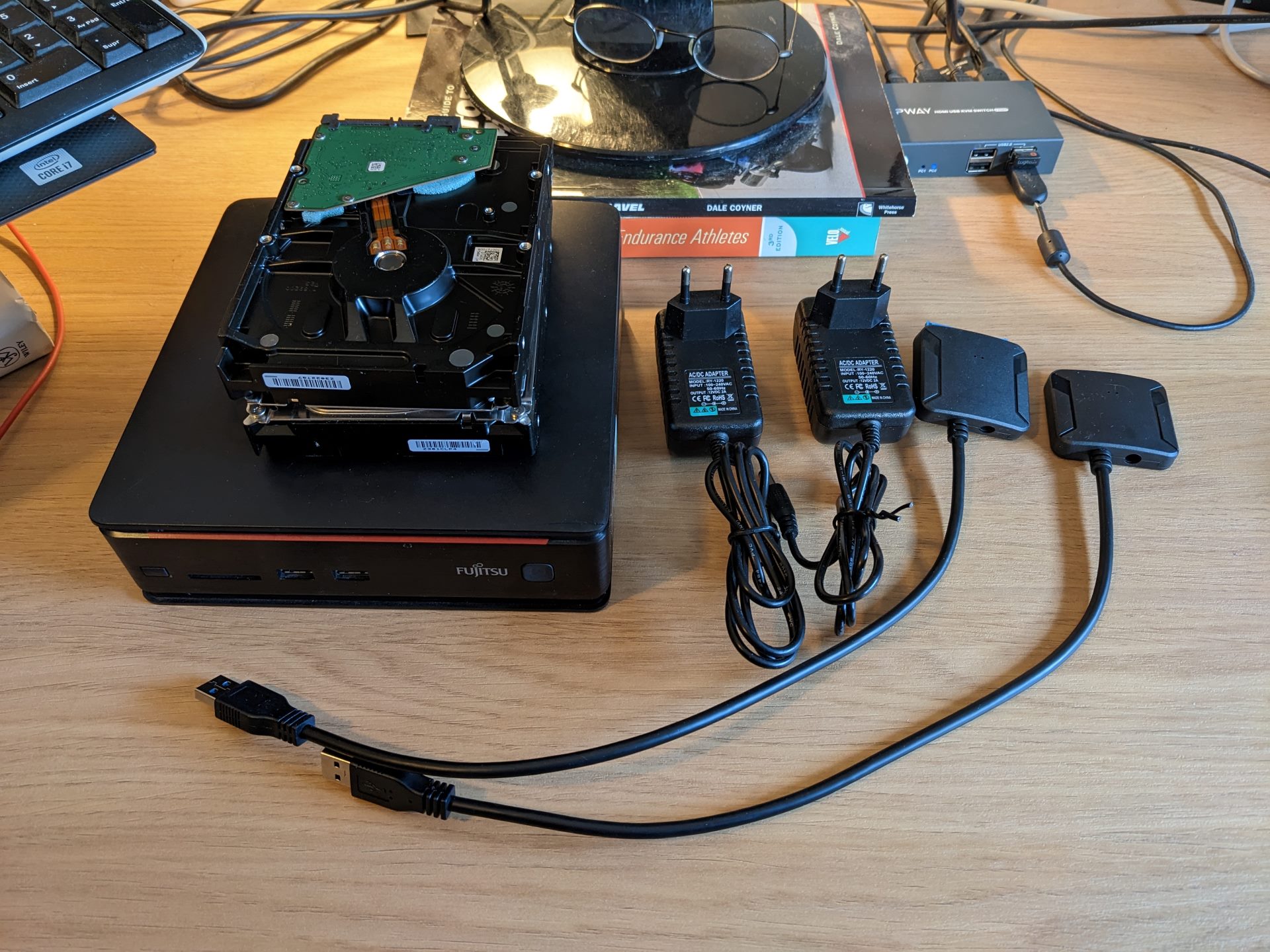
But I’m not going to leave the drives out and about on my desk, that’s no good. No no I have a much “better” idea.

I have this small plastic drawer set I can use to house the drives. But how are the cables from the drives going to exit the drawers? Glad you asked, let me get something from under my bed:
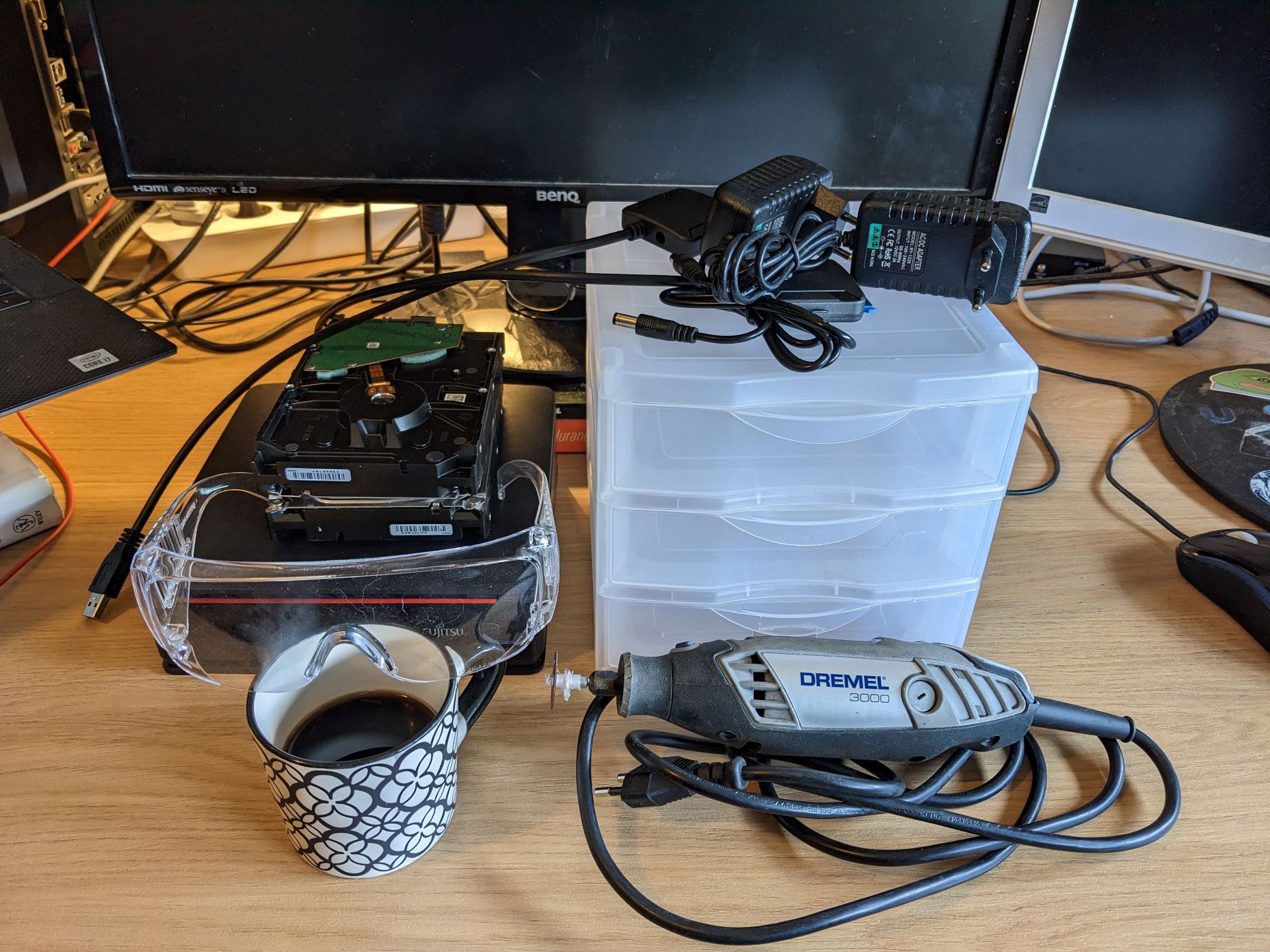
That's right, we're gonna Dremel our way to success.
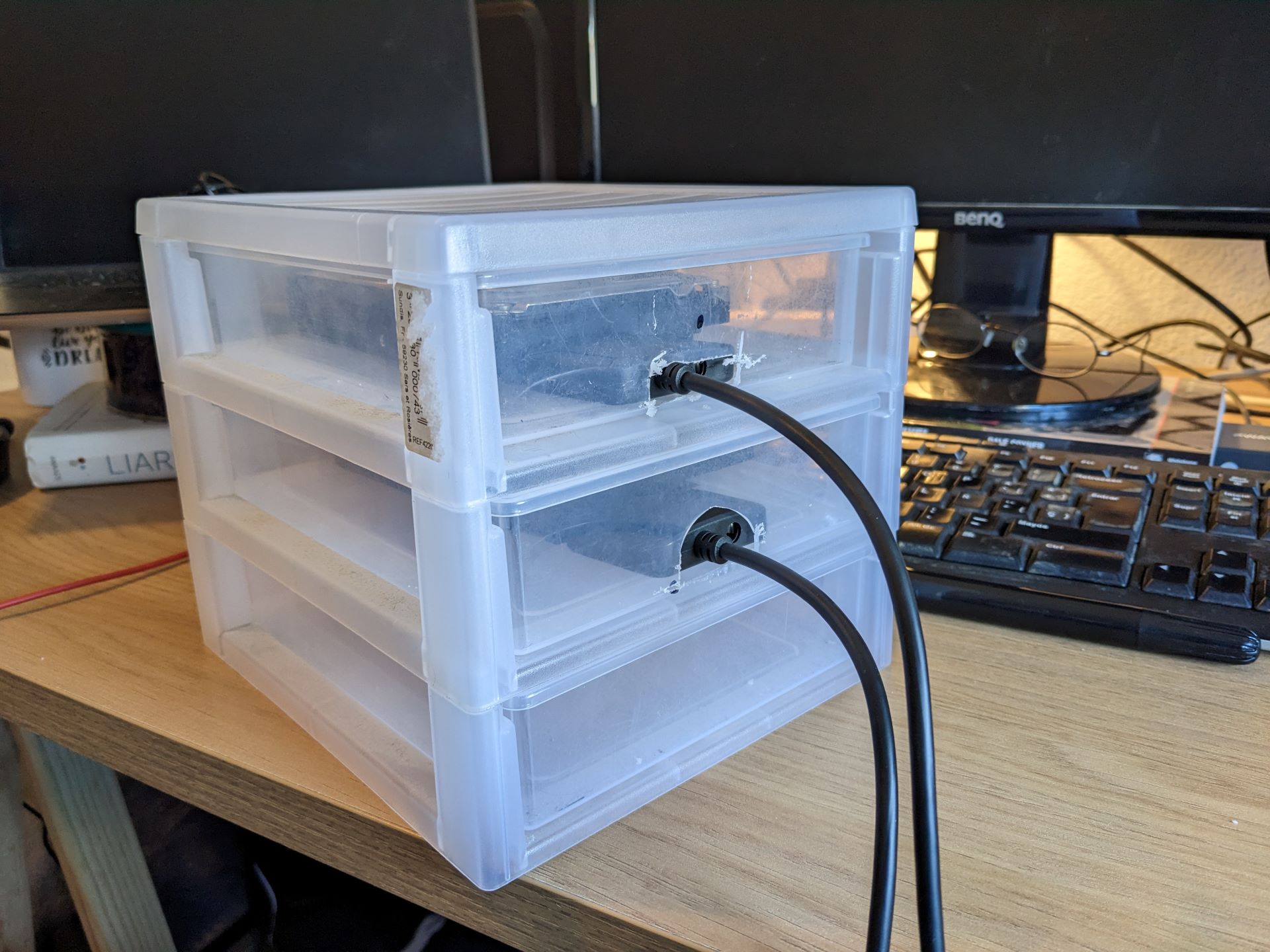
Uuuh there was a bit of a happy accident with the middle drawer.
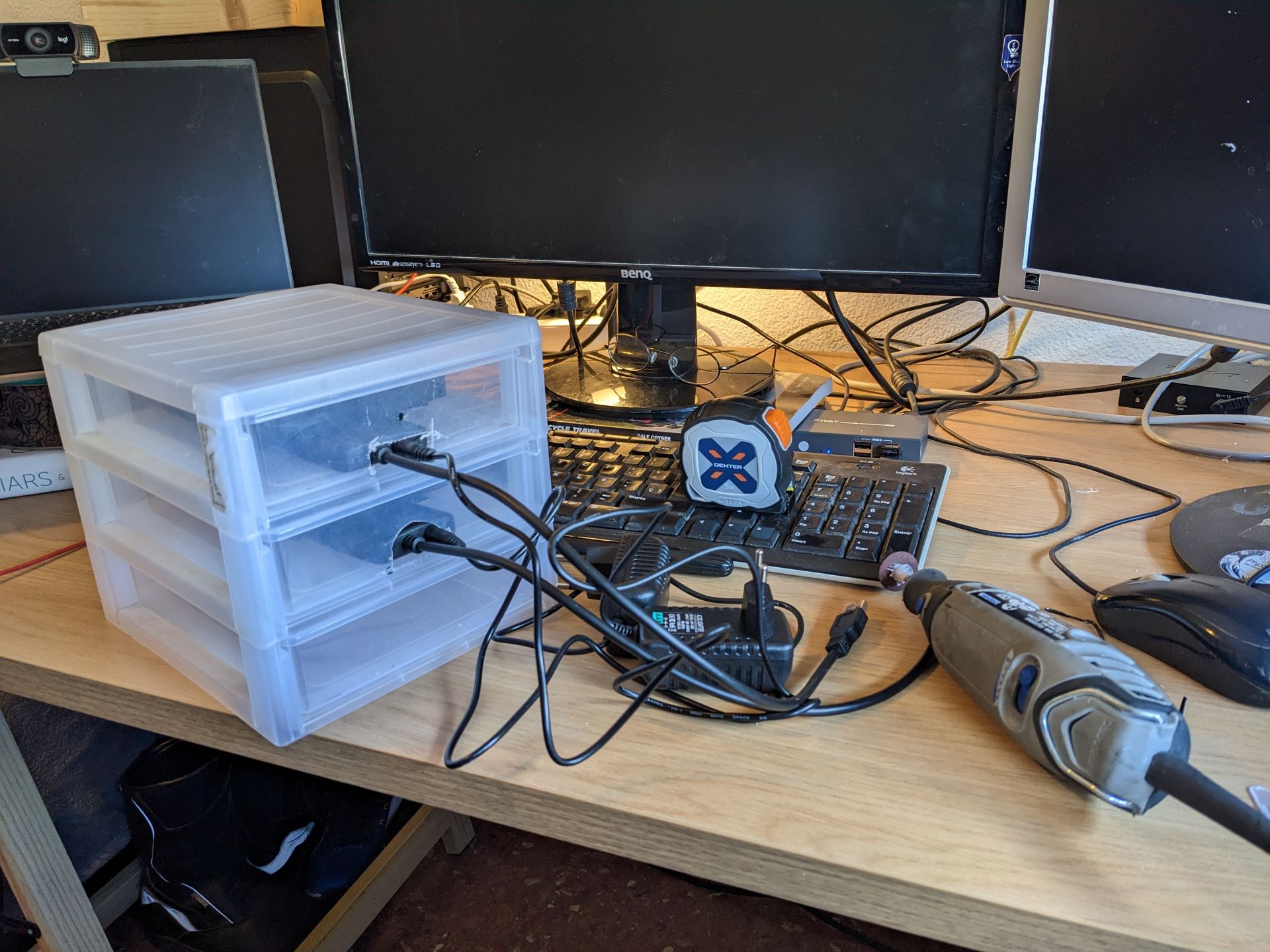
Overall, not bad!
Lets assemble everything, plug in the disks, turn the computer on and… oh.
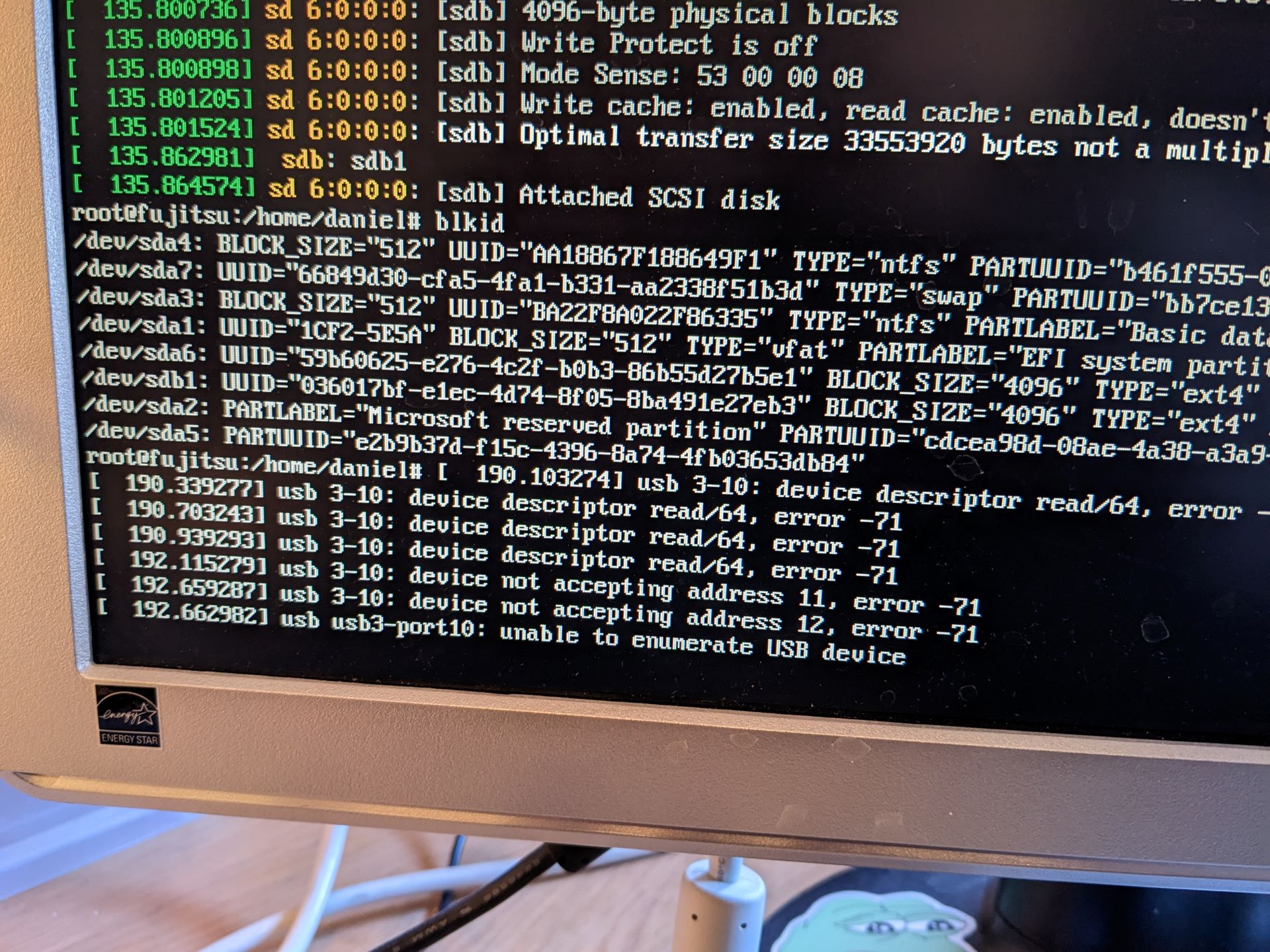
Disk errors make pepe sad.
Something didn’t work – I might’ve pushed my luck a bit too far with eBay disks and Aliexpress adaptors.
After some brief troubleshooting, I narrowed it down to one of the USB adaptors being faulty. Luckily I had spare one from Amazon that is known to work. I’m now using different adaptors for each disk, I hereby knock on wood.
RAID 0 over USB⌗
The kernel wiki tells me RAID over USB is a bad idea, but I want read access to be fast. Bad ideas can be entertaining, I’m going to use this tutorial from Linuxbabe.com as a starting point.
Here’s everything executed to set up RAID:
sudo su
parted /dev/sdb mklabel gpt
parted /dev/sdc mklabel gpt
fdisk /dev/sdb <- n, enter, enter, enter, t, raid, enter, w
fdisk /dev/sdc <- n, enter, enter, enter, t, raid, enter, w
apt-get update
apt-get install mdadm
mdadm --create /dev/md0 --level=0 --raid-devices=2 /dev/sdb1 /dev/sdc1
mkfs.ext4 /dev/md0
mount /dev/md0 /disk
The above worked, lets write something to disk and see what gives:
mkdir -p /disk/benchmark
cd disk/benchmark
dd if=/dev/zero of=data.bin bs=1M count=10000
Aaaand its taking forever. Something doesn’t feel right. I’m gonna go get some toast or something and check this in a few minutes.
I’m back with a yoghurt and dear god:
[ 4908.422277] blk_update_request: I/O error, dev sdb, sector 17599488 op 0x1:(WRITE) flags 0x0 phys_seg 128 prio class 0
[ 4908.422398] EXT4-fs warning (device md0): ext4_end_bio:344: I/O error 10 writing to inode 172097562 starting block 4333440)
[ 4908.422421] sd 6:0:0:0: [sdb] tag#27 timing out command, waited 180s
[ 4908.422489] Buffer I/O error on device md0, logical block 4331520
[ 4908.422496] sd 6:0:0:0: [sdb] tag#27 FAILED Result: hostbyte=DID_RESET driverbyte=DRIVER_OK cmd_age=184s
[ 4908.422501] sd 6:0:0:0: [sdb] tag#27 CDB: Write(16) 8a 00 00 00 00 00 01 0c 98 00 00 00 04 00 00 00
[ 4908.422575] blk_update_request: I/O error, dev sdb, sector 17602560 op 0x1:(WRITE) flags 0x0 phys_seg 128 prio class 0
[ 4908.422582] Buffer I/O error on device md0, logical block 4331521
[ 4908.422774] Buffer I/O error on device md0, logical block 4331522
[ 4908.422846] Buffer I/O error on device md0, logical block 4331523
[ 4908.422917] Buffer I/O error on device md0, logical block 4331524
But wait there’s more:
Message from syslogd@fujitsu at Feb 25 19:17:44 ...
kernel:[ 5314.790940] EXT4-fs (md0): failed to convert unwritten extents to written extents -- potential data loss! (inode 172097562, error -30)
Yeah this not going well at all 😂
I’m looking at the output of dstat and a few hundred megabytes are written to disk and then nothing is written for several seconds. I wonder if the kernel cannot handle disk caching on raid over USB correctly. Let me try disabling disk cache to see if that’ll do anything:
root@fujitsu:/home/daniel# hdparm -W 0 /dev/md0
/dev/md0:
setting drive write-caching to 0 (off)
HDIO_DRIVE_CMD(flushcache) failed: Inappropriate ioctl for device
HDIO_DRIVE_CMD(setcache) failed: Inappropriate ioctl for device
HDIO_DRIVE_CMD(flushcache) failed: Inappropriate ioctl for device
This is odd. I was expecting maybe a hiccup or two with RAID over USB but this is too catastrophic, some more troubleshooting is in order.
Oh noes⌗
The other Aliexpress SATA to USB adaptor was also faulty. Out of the two adaptors:
- One was completely faulty (disk wouldn’t even show)
- One was partially faulty (disk would show but writes would fail).
Into the trash they go, Aliexpress can be a gamble and this time we didn’t win.
RAID 0 over USB could still work, but with these cursed adaptors its not something we’ll find out today. So back to the drawing board – what can be accomplished with the hardware we have at hand right now?
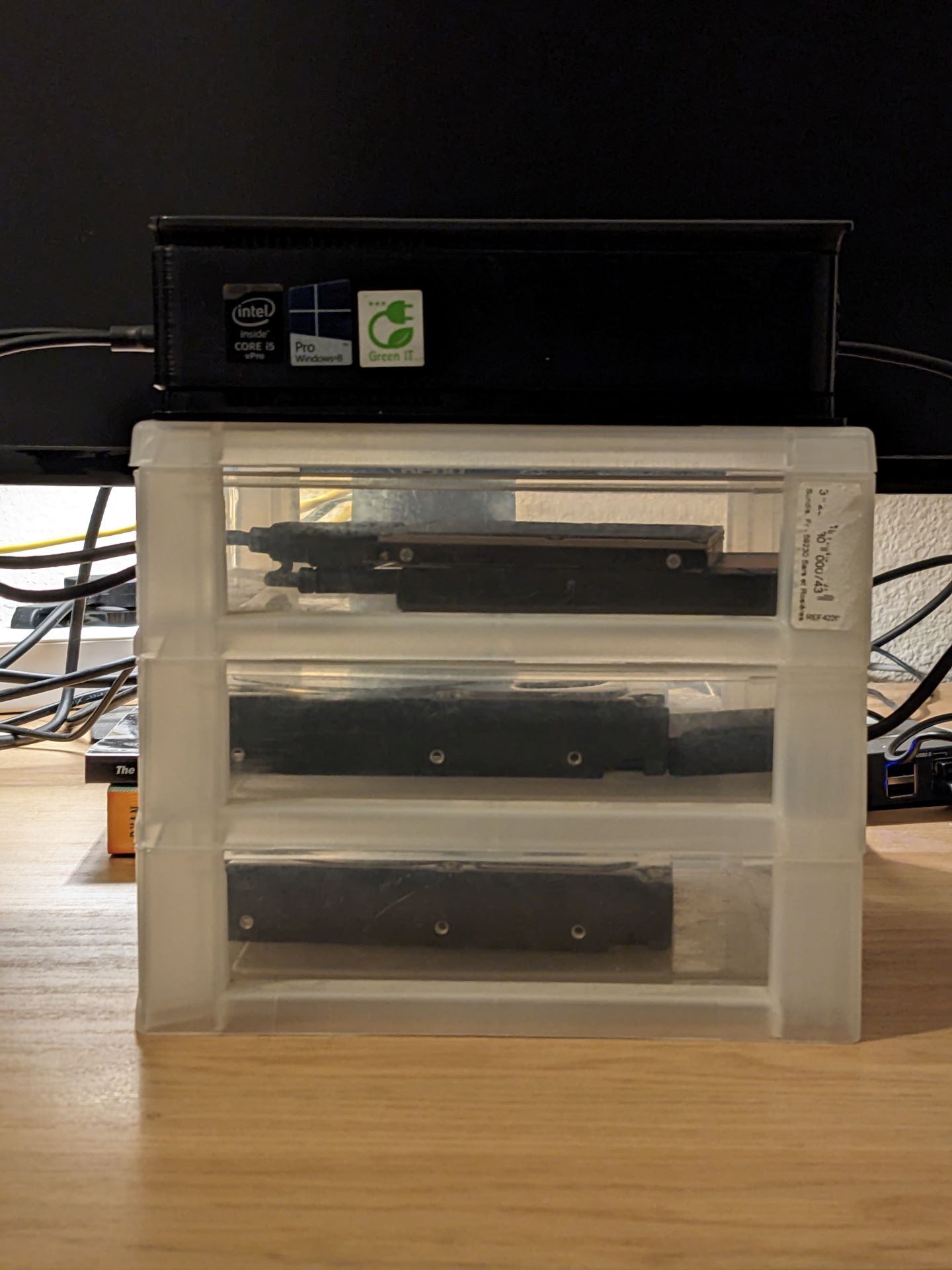
Here’s what we have on the humble plastic drawer set:
| Level | Item | Details |
|---|---|---|
| 3 | Fujitsu | One square chonky boi |
| 2 | 2.5" 1TB, 500GB | Disks with other SATA to USB adaptors I had lying around (no PSUs, so not for 3.5") |
| 1 | 3.5" 4TB | Connected with a working SATA to USB adaptor from Amazon |
| 0 | 3.5" 4TB | Unused until I get another adaptor or do something else with it |
This leaves this set up with 5.5TB of storage over 3 disks. Not what I was aiming for, but it’ll do until I revisit this project again.
Upgrading transmission⌗
On the first post, I noticed that the transmission-daemon had a memory leak with my use case:

I googled a bit and people with this issue were told to upgrade. Ubuntu only has the 3.0 version on the apt repos, lets try the 4.0 version from transmissionbt.com/download:
wget https://github.com/transmission/transmission/releases/download/4.0.1/transmission-4.0.1.tar.xz
tar -xvlf https://github.com/transmission/transmission/releases/download/4.0.1/transmission-4.0.1.tar.xz
cd transmission-4.0.1/
vim docs/Building-Transmission.md #Ah, instructions!
apt-get install git build-essential cmake libcurl4-openssl-dev libssl-dev python3 build-essential automake autoconf libtool pkg-config intltool libcurl4-openssl-dev libglib2.0-dev libevent-dev libminiupnpc-dev libgtk-3-dev libappindicator3-dev
mkdir build
cd build
cmake -DCMAKE_BUILD_TYPE=RelWithDebInfo ..
make
sudo make install
And tranmission is upgraded!
A conclusion, for now⌗
Things didn’t go as planned but this was an entertaining experience and I learned a thing or two. I’ll almost certainly revisit this project again in the future, so there’ll be more shenanigans to come. Until next time!
An update, a few months later⌗
Shortly after this whole adaptor fiasco I got myself some better SATA to USB adaptors (25€ ugreen ones on Amazon) and set up the RAID 0 over USB as intended with no issues. It has been working great these last few months:
df -h
Filesystem Size Used Avail Use% Mounted on
tmpfs 1.6G 1.7M 1.6G 1% /run
/dev/sda6 170G 20G 142G 12% /
tmpfs 7.8G 0 7.8G 0% /dev/shm
tmpfs 5.0M 0 5.0M 0% /run/lock
/dev/sdb1 458G 190G 245G 44% /disk3
/dev/sdd1 916G 36K 870G 1% /disk2
/dev/md0 7.3T 840G 6.1T 12% /disk
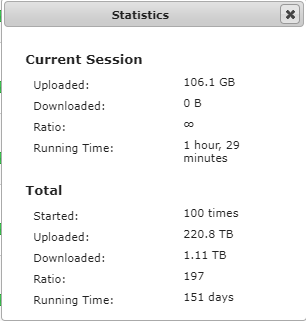
Only once the BIOS got a bit confused once after a power outtage and didn’t detect a disc right away. Some USB unplugging, plugging and restarts fixed it. I had no Linux or Kernel level issues.
RAID over USB is definitely not suited for storing data reliably, but for a homelab project or for data that can be easily recreated (such torrents) it does work reliably enough. Thank you for reading!